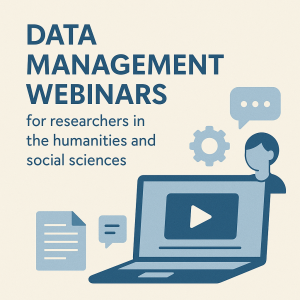FORS-DaSCH webinar series:
Data Management for the Social Sciences and Humanities
FORS and the Swiss National Data and Service Center for the Humanities (DaSCH) offer a series of free online data management webinars. The webinars are specifically designed for researchers in the humanities and social sciences who collect and/or process research data in the Swiss context.
The next webinar in the series entitled Workflows for Anonymization will take place on February 26, 2026 (2:00-3:30 pm). This webinar will be hosted by Rita Gautschy (DaSCH) and Pedro Araujo (FORS) and introduces the foundational principles of data anonymization and its application in the social sciences and humanities.
Participants will learn to distinguish different degrees of de-identification, when there is a need to understand how anonymization practices interact with consent agreements and access restrictions, and identify direct and indirect identifiers. The session will also calrify when anonymization is required while addressing how to balance the preservation of analytical value with the protection of research participants. Practical examples will be provided throughout to illustrate common challenges and solutions.
Previous workshop
The fifth webinar took place on December 11, 2025 and was devoted to the topic of Informed consent in the social sciences and humanities. The webinar was given by Noémi Villars-Amberg (DaSCH) and Alexandra Stam (FORS). The following was discussed: informed consent, its significance, and its scope of application in both the social sciences and humanities. It then delved into its contents, be it for collecting personal research data or sharing the data through a research repository. The webinar will then outline the five essential criteria that must be met to ensure its validity: consent must be specific, freely given, informed, explicit, and dynamic. The second part of the webinar focused on concrete case studies. Alexandra Stam highlighted common considerations and challenges in the social sciences when obtaining informed consent, while Noémi Villars-Amberg addressed data reuse in the humanities, emphasizing how to ensure that initial consent remains valid in this context.
The third webinar of the FORS-DaSCH series was on Authority data, standards and metadata and took place online on May 28, 2025, and was hosted by Rita Gautschy (DaSCH) and Auriane Marmier (FORS).
Rita Gautschy introduced the use of authority data and standards in the humanities, explaining how they ensure consistency, interoperability, and discoverability across datasets. By assigning unique and standardized identifiers to entities such as persons, places, and works, authority data facilitates metadata linking and prevents ambiguities. Standards such as the International Image Interoperability Framework (IIIF) and the Text Encoding Initiative (TEI) support structured representation, annotation, and integration of digital materials, thereby enhancing long-term data sustainability and scholarly collaboration.
Auriane Marmier focused on metadata in the social sciences, presenting widely used standards such as the Data Documentation Initiative (DDI). She highlighted the advantages of using DDI for documenting social science data, including products like the DDI Codebook and DDI Lifecycle. The presentation also introduced controlled vocabularies and thesauri (e.g., ISCO, ISCED, ELSST) and explained their role in achieving semantic clarity and interoperability.
The webinar concluded with a brief comparison of metadata practices in the humanities and social sciences, identifying shared challenges and complementary approaches.
The video of the presentation can be viewed here: https://rec.unil.ch/videos/authority-data-standards-and-metadata/
The slides are accessible here: https://forscenter.ch/wp-content/uploads/2025/06/forsdasch_webinar_metadata.pdf
__________________________________________________________________________________________
The second workshop FAIR and CARE Principles took place on February 5, 2025 and was hosted by Noemi Villars-Amberg (DaSCH) and Meret Hildebrandt (FORS). It will cover the theory behind the FAIR and CARE principles, followed by practical applications illustrated through two case studies. The webinar concluded with a 30-minute discussion.
The video of the presentation can be viewed here: https://rec.unil.ch/videos/planning-data-management-fair-care-principles/
__________________________________________________________________________________________
The first workshop on Planning Data Management took place on November 6, 2024 and was led by Rita Gautschy (DaSCH) and Auriane Marmier (FORS).
After a brief introduction to Open Science, the origins of the DMP, and the various requirements from funder and legal perspectives, the webinar presented two case studies of particular interest to the humanities and social sciences. These followed the SNSF template and focused on projects that collected different types of data, often raising challenges for researchers, namely images and interview data. The webinar then concluded with a 30-minute discussion on DMPs. By the end, participants were expected to better understand the SNSF requirements for data management planning and the subtleties of handling images and/or interview data.
This was an introductory-level Zoom meeting intended for social science and humanities researchers, as well as anyone interested in data management and data sharing. No prior experience or knowledge was required to participate.
Webinar video and resources
The video of the presentation can be viewed here: https://rec.unil.ch/videos/webinar-planning-data-management-first-edition-of-the-fors-dasch-webinar-series/




